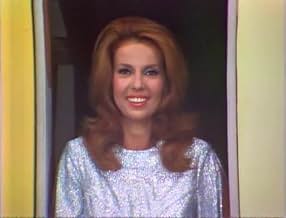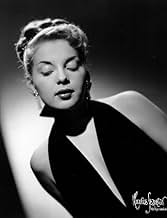Abbe Lane
- Actress
- Soundtrack
Singer and actress Abbe Lane made a splash in the 50s and 60s with revealing costumes and a seductive style of dancing. Far removed from her sultry Latin image, she was born Abigail Francine Lassman in Brooklyn, of Jewish parentage. Abbe began performing on radio from the age of four and first appeared on screen two years later (under her birth name) in the Vitaphone featurette Toyland Casino (1938), warbling "Five and Ten Cent Soldiers on Parade". Billed as Abbe Marshall --probably in deference to her father's first name 'Abbey'-- she became a hoofer on Broadway by her mid-teens (having lied about her age to get into musicals), before finagling a gig on television as a vocalist for bandleader Vincent Lopez. While performing a calypso number in the 1948 Broadway musical As Girls Go, she was spotted by the charismatic Spanish maestro Xavier Cugat and hired on the spot. For the next few years, she became 'Cugie's' featured vocalist and the 'Rumba King's' star attraction.
Despite a considerable difference in their respective ages (he was thirty-two years her senior), Lane and Cugat married in 1952. During their twelve years together, Lane sang on several Cugat LP's and was featured --with her hair dyed blonde-- on the cover of "The Best of Cugat", a compendium of hits released by Mercury Records. In 1958, Abbe co-starred on Broadway opposite Tony Randall in Oh, Captain, a musical comedy based on the English motion picture The Captain's Paradise (1953). She also sidelined as a nightclub singer, recorded a popular album with Tito Puente's orchestra, entitled "Be Mine Tonight" and appeared in a handful of Hollywood pictures.
Frustrated with being typecast in American films merely as "a decorative accessory", Lane joined Cugat in Italy in 1956 and enjoyed almost immediate screen success. Her first motion picture lead was in I girovaghi (1956), as a fiery dancer who enchants Peter Ustinov's itinerant puppeteer. The following year, she partnered Gabriele Ferzetti (as a suave jewel thief) in the caper comedy Parola di ladro (1957) and starred alongside Totò and Vittorio De Sica in another comedy, The Lady Doctor (1957). Aside from romances and musicals, Lane also featured in peplum (Caesar Against the Pirates (1962)) and as the tempestuous ex-flame of daredevil fire fighter Cornel Wilde (who also directed) in the Paramount love-triangle melodrama Maracaibo (1958), which was filmed on location in Venezuela.
In 1956, Cugat returned to New York while his spouse opted to remain in Italy. The bandleader had no intention of raising a family and this ultimately led to the couple's divorce in June 1964. Lane did not stay single for long. By November, she had moved back to America and married Harvard graduate and Hollywood theatrical agent Perry Leff. The union produced two sons and endured until Leff's death in 2020.
Though unable to reignite her career as an actress, Lane went on to appear as panelist or singer on numerous TV variety shows throughout the 60s and 70s, hosted by the era's most prominent emcees, including Ed Sullivan, Steve Allen, David Frost, Jack Paar, Merv Griffin and Johnny Carson. In her later years, Lane tended to distance herself from her previous sensual image. In January 1993, she published a semi-autobiographical novel, entitled But Where is Love?, a thinly-veiled account of her early career and turbulent marriage to Cugat.
Abbe Lane has a star on the Walk of Fame on Hollywood Boulevard.
Despite a considerable difference in their respective ages (he was thirty-two years her senior), Lane and Cugat married in 1952. During their twelve years together, Lane sang on several Cugat LP's and was featured --with her hair dyed blonde-- on the cover of "The Best of Cugat", a compendium of hits released by Mercury Records. In 1958, Abbe co-starred on Broadway opposite Tony Randall in Oh, Captain, a musical comedy based on the English motion picture The Captain's Paradise (1953). She also sidelined as a nightclub singer, recorded a popular album with Tito Puente's orchestra, entitled "Be Mine Tonight" and appeared in a handful of Hollywood pictures.
Frustrated with being typecast in American films merely as "a decorative accessory", Lane joined Cugat in Italy in 1956 and enjoyed almost immediate screen success. Her first motion picture lead was in I girovaghi (1956), as a fiery dancer who enchants Peter Ustinov's itinerant puppeteer. The following year, she partnered Gabriele Ferzetti (as a suave jewel thief) in the caper comedy Parola di ladro (1957) and starred alongside Totò and Vittorio De Sica in another comedy, The Lady Doctor (1957). Aside from romances and musicals, Lane also featured in peplum (Caesar Against the Pirates (1962)) and as the tempestuous ex-flame of daredevil fire fighter Cornel Wilde (who also directed) in the Paramount love-triangle melodrama Maracaibo (1958), which was filmed on location in Venezuela.
In 1956, Cugat returned to New York while his spouse opted to remain in Italy. The bandleader had no intention of raising a family and this ultimately led to the couple's divorce in June 1964. Lane did not stay single for long. By November, she had moved back to America and married Harvard graduate and Hollywood theatrical agent Perry Leff. The union produced two sons and endured until Leff's death in 2020.
Though unable to reignite her career as an actress, Lane went on to appear as panelist or singer on numerous TV variety shows throughout the 60s and 70s, hosted by the era's most prominent emcees, including Ed Sullivan, Steve Allen, David Frost, Jack Paar, Merv Griffin and Johnny Carson. In her later years, Lane tended to distance herself from her previous sensual image. In January 1993, she published a semi-autobiographical novel, entitled But Where is Love?, a thinly-veiled account of her early career and turbulent marriage to Cugat.
Abbe Lane has a star on the Walk of Fame on Hollywood Boulevard.



































